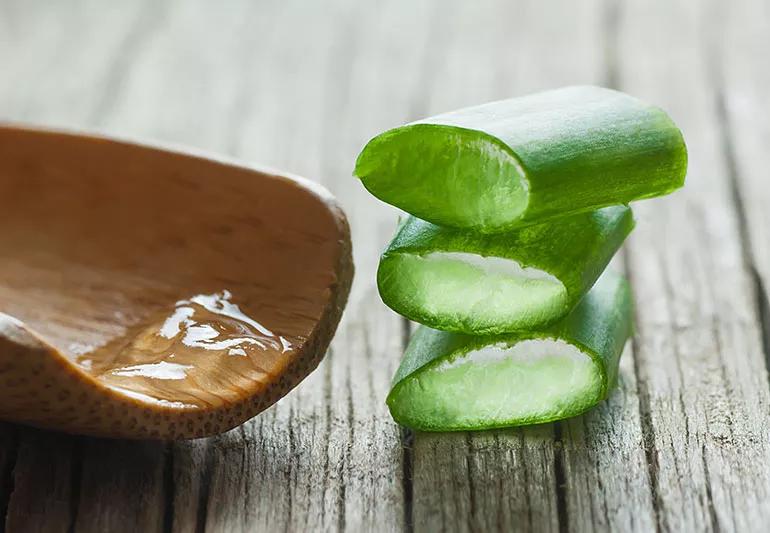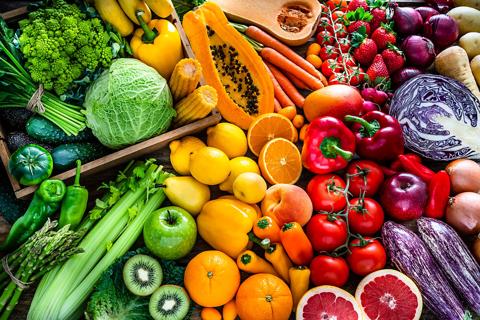Advertisement
Find out what these options can do to the body

When you’re struggling to lose weight, it might be tempting to want to try every pill and potion on the internet that promises to blast, burn or melt the pounds away — in a matter of weeks. The thing is, those concoctions could make things worse instead of better. So what’s the skinny on herbal weight loss supplements? Obesity medicine physician Shweta Diwakar, MD, helps us understand how they work and why it’s better to stick with a supervised weight loss program.
Advertisement
Cleveland Clinic is a non-profit academic medical center. Advertising on our site helps support our mission. We do not endorse non-Cleveland Clinic products or services. Policy
According to Dr. Diwakar, there is a lack of high-quality evidence to suggest how herbal weight loss supplements work.
Herbal supplements claim to cause weight loss through:
“Most herbal supplements have limited or no consistent data to support long-term weight loss efficacy and safety. They also have the potential for adverse interactions between supplements and prescription medications. Unlike medications, supplements are not intended to treat, diagnose, prevent or cure diseases. Therefore, claims such as ‘reduces pain’ or ‘treats heart disease’ aren’t substantiated. Claims like these can only legitimately be made for drugs that go through scientific rigor, a process that’s not routinely followed for dietary supplements,” says Dr. Diwakar.
One mistake that people make is thinking that herbal supplements are good for them because the ingredients aren’t synthetic. Dr. Diwakar points out that herbs are not always safe just because they’re natural. In fact, increased herbal and dietary supplement (HDS) use is directly proportional to increased HDS-induced liver injuries.
“HDS-induced liver injuries account for about 20% of the cases of liver damage in the U.S. The major implicated ingredients for these cases include anabolic steroids and green tea extract. Many weight loss supplements that are considered unsafe can be found online. It’s important to recognize that these products can come with associated risks.”
Advertisement
If you’re getting an herbal product from a retail chain, keep in mind that the salesperson might have limited knowledge about how the product works. They also might not be aware of reported problems or how the herbs might interact with medications that you may be taking. Many herbal manufacturers also make false claims about the health benefits of these products. For all of these reasons and the lack of proven health benefits, it’s best to avoid herbal weight loss supplements or to talk to your healthcare provider about other options.
Other things to keep in mind should you still decide to try an herbal weight loss supplement:
Here are some key points about common herbal weight loss products and some insights as to their effectiveness as weight loss agents.
Advertisement
Ephedrine: Ephedrine is a common ingredient in herbal dietary supplements used for weight loss. It’s also an ingredient found in asthma medicine. In addition, ephedrine is used to make methamphetamine or speed.
“Ephedrine can slightly decrease your appetite, but no studies have shown it to be effective in weight loss. Ephedrine can be dangerous. It can cause high blood pressure, changes in heart rate, trouble sleeping, nervousness, tremors, seizures, heart attacks, strokes and even death. Ephedrine can also interact with many prescription and over-the-counter medications. In the US, ephedra-containing dietary supplements are no longer available.”
St. John’s wort: St. John’s wort, also called hypericum, is a plant that has been used for centuries to treat mental disorders, nerve pain, malaria, insect bites, wounds, burns and other conditions. More recently, St. John’s wort has been studied to treat depression, but studies have shown that it was no more effective than a placebo.
There aren’t too many studies that examine the use of St. John’s wort as a weight-loss agent. However, keep in mind that it shouldn’t be combined with anything that contains tyramine — aged cheeses, cured or processed meats, wine, pickled or fermented vegetables and citrus or tropical fruit to name a few.
It also shouldn’t be combined with:
Advertisement
“Overall, using St. John’s wort for weight loss isn’t a good idea because it’s potentially very dangerous.”
5-hydroxytryptophan (5-HTP). 5-hydroxytryptophan (5-HTP) is found in some over-the-counter weight loss formulas. This extract from a West African plant seed contains an ingredient that is linked to a rare and potentially deadly blood disorder. It has not been proven to be an effective weight-loss agent. Until more is known, 5-HTP products should be avoided.
Chitosan: This dietary supplement is made from chitin, a starch found in the skeleton of shrimp, crab, and other shellfish. Chitosan binds with fat in fatty food, moves it through the digestive tract and then, the fat is passed out of the body in bowel movements. Some research suggests that combining chitosan with a calorie-restricted diet might result in a small amount of weight loss. But taking chitosan without reducing caloric intake doesn’t appear to cause weight loss. People with shellfish allergies might be allergic to chitosan as well.
Pyruvate: Pyruvate is formed when the body digests carbohydrates and proteins. Some research suggests that it may promote slight weight loss. Found in the form of pyruvic acid, pyruvate is in many different types of foods, including red apples, cheese, and red wine. Pyruvate appears to be safe, but its claims of boosting metabolism, decreasing appetite and aiding in weight loss need further study.
Aloe: Aloe, or aloe vera, is a plant that is related to cacti. Oral forms of aloe are added to herbal weight-loss products. Oral aloe causes bowel movements and many aloe weight-loss products are marketed as “internal cleansers.” Aloe supplements have not been proven to promote permanent weight loss. Taking oral aloe can lead to side effects such as abdominal cramping, diarrhea, electrolyte disturbances, and decreases in potassium. Therefore, taking oral aloe is likely unsafe, especially at high doses.
Advertisement
Cascara: Cascara is only marketed as a dietary supplement. It is a common ingredient in weight loss products and is mostly used as a laxative for constipation. Misuse of this herb can cause disturbances in electrolytes (such as potassium and sodium). Electrolytes help your body maintain normal functioning. Do not take if you are pregnant or lactating (can be passed into breast milk). Cascara may interact with medications such as digoxin and diuretics.
Dandelion: Dandelion is a natural diuretic (a substance that makes you urinate more often). This is how it causes weight loss. Dandelion has been known to cause allergic reactions. People who are allergic to ragweed and related plants (daisies, chrysanthemums, marigolds) are likely to be allergic to dandelion.
Glucomannan: Glucomannan is a sugar made from the root of the konjac plant (Amorphophallus konjac). It is available in powder, capsules, and tablet forms. Glucomannan might work in the stomach and intestines by absorbing water to form a bulky fiber that treats constipation. It may also slow the absorption of sugar and cholesterol from the gut. Glucomannan tablets are not considered safe as they can sometimes cause blockages of the throat or intestines. Glucomannan may interfere with blood sugar control. Blood sugar should be closely monitored if you have diabetes and use glucomannan.
Guarana: Made from the seeds of a plant native to Brazil, guarana is an effective central nervous system stimulant. It is used as a weight loss product due to its stimulant and diuretic effects. Guarana contains caffeine and may cause high blood pressure. Some of the extracts have been known to interact with anticoagulants (e.g., warfarin [Coumadin®]) and lengthen the bleeding time in the event of a health emergency. Many advertisements state that guarana is free from side effects; however, this statement is not true. Side effects may include nausea, dizziness, and anxiety.
Yerba mate: Also known as “Paraguay tea,” yerba mate is a strong central nervous system stimulant (the doses typically used mimic that of 100 to 200 milligrams of caffeine). The main reported side effects excessive central nervous system stimulation (speeding up the body’s mental and physical activity) and high blood pressure. Yerba mate has not been proven as a weight-loss aid. A few cases of poisoning, which led to hospitalization, have been reported with the use of this product. When taken in large amounts or for long periods, yerba mate increases the risk of mouth, esophageal, laryngeal, kidney, bladder and lung cancers. This risk is especially high for people who smoke or drink alcohol.
Guar gum: Also known as guar, guar flour, and jaguar gum, guar gum is a dietary fiber obtained from the Indian cluster bean. Guar gum is often used as a thickening agent for foods and drugs. It has been studied for decreasing cholesterol, managing diabetes and weight loss. As a weight-loss product, it helps move foods through the digestive tract and firms up stool. It can decrease appetite by providing a feeling of fullness. However, like glucomannan, guar gum and guar gum preparations have been linked to causing blockages in the esophagus. The water-retaining ability of the gum permits it to swell to 10- to 20-fold and has led to gastrointestinal blockages. Guar gum can also cause large swings in blood glucose (sugar) levels. If you have diabetes, you should avoid this ingredient.
Herbal diuretics: Many herbal diuretics are commonly found in over-the-counter (OTC) weight-loss products and herbal weight-loss products. Most of the diuretics used OTC come from xanthine alkaloids (like caffeine or theobromine). Avoid anything that contains juniper seeds (capable of causing renal damage), equistine (neurotoxic and can cause brain damage) and horsetail/shave grass (contain several dangerous ingredients that can lead to convulsions or hyperactivity).
Herbal diuretics can interact with certain drugs like lithium, digoxin, or conventional diuretics such as furosemide or hydrochlorothiazide. They also do not provide enough water loss to be considered effective weight loss aids.
While many products out there suggest that they can help you lose weight fast, they can also come with a slew of health concerns. If you need help with starting your weight loss journey, talk to your provider. They can steer you in the right direction and help you find a program that is safe and effective.
Learn more about our editorial process.
Advertisement

Far more research is needed to support the many touted health claims

Supplements with colloidal silver offer no proven health benefits and could be harmful

Focus on your body’s metabolic set point by eating healthy foods, making exercise a part of your routine and reducing stress

Chamomile, lavender and valerian root teas may offer a faster route to dreamland

If you’re taking supplements, it’s important to understand which vitamins and minerals you can get too much of, like vitamin C and calcium

Juicing cleanses don’t target fat loss — and you’ll lose important nutrients in the process

Research suggests the effect of the supplement, particularly for prostate health, may not deliver believed benefits

Found in colorful foods like spinach, corn and oranges, this carotenoid helps with eye, skin and liver health

Focus on your body’s metabolic set point by eating healthy foods, making exercise a part of your routine and reducing stress

PFAS chemicals may make life easier — but they aren’t always so easy on the human body

While there’s little risk in trying this hair care treatment, there isn’t much science to back up the claims